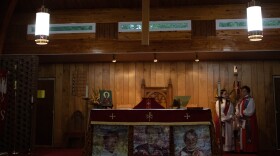Hayden Davis is an 18 year old Biomedical Engineering student at UNC Chapel Hill. He drives between work and home in his 2004 Honda Accord most weekdays. Joan Cohen is a senior resident at the Forest at Duke. She is a potter and uses a walker to get around her retirement community.
While on the surface they might not have much in common, they both love jazz, and they both came to a concert at the Forest at Duke that I put on with my friends earlier this summer.
Music is very much a part of people's lives and you have to bring it to them with all the joy you can...If you can make people forget for a half hour or an hour, it's a great deal. -Marisa Galvany
As a recent graduate of the North Carolina School of Science and Math and bassist from Wake Forest, I aim to use jazz to connect intergenerational communities in our region.
Our group is composed of pianist Troy Thomas, saxophonist Hayden Davis, drummer Kevin Woicyk, and myself. We all attended Heritage High School in Wake Forest, North Carolina, though at varying times. While we hadn’t played together in four years, we quickly reconnected in late June to visit the Forest at Duke, a retirement community in Durham, to play jazz for its original fans.
“They grew up with these musicians, and we study them,” Thomas explained about our connection to jazz.
As performers, we have our own unique connections to music. For Hayden Davis, it goes back to the first album he owned.
“'A Love Supreme' by John Coltrane, it was the first album my dad bought for me,” Davis said. “People don’t connect very well with that, but I liked how different it was and how it explored music and it was creative. I’d say I got into it from that album.”
Many people born in 2000 can’t say their first album was a jazz classic. Jazz has been an instrumental part of my life, which most people my age can’t relate to. I spent my high school years admiring musicians like Miles Davis and Ray Brown for their ability to communicate wordlessly with other musicians and express themselves through improvisation.

As it turns out, residents at the Forest at Duke, our audience for the afternoon, spent their teenage years falling in love with the same things.
Cohen, the Forest at Duke resident, doesn’t play any musical instruments but still enjoys music and reflected on her experience with jazz.
“I love jazz… [I listened] on the radio, in clubs,” she said. “My husband and I, we’d often go to jazz clubs and listen to jazz.”
The day my band and I visited, we played half an hour of some of the biggest hits of the early 20th century, including Bart Howard’s "Fly Me to the Moon" and Erroll Garner’s "Misty."
Playing this music for its original audience is a rich connection to the past and our influences, which Thomas describes with the example of funk, a descendant of jazz.
“We just have a lot of differences, but funk can be that bridge between older generations and younger generations”, Thomas said. “Our generation has like a totally different sound for music but we still keep to our roots, and funk is one of those roots. I feel like we’re still connected.”
Through that connection, we benefit from the wisdom from the musicians that came before us. Marisa Galvany, former soprano at the New York City Opera was also in the audience for our performance. She talked about the changing role of music in her lifetime.

“It’s a very different world now, things are so easy to get,” Galvany said. “It wasn’t always that easy, you went through a lot of hard times, people had problems, the monies were not easy, so they would listen to the radio to forget."
She added: “Music is very much a part of people’s lives and you have to bring it to them with all the joy you can, especially today, the world is in a very bad position. So if you can make people forget for a half hour or an hour, it’s a great deal. And I appreciate it all the time.”
By coming to this community and playing music, my goal was to help the audience remember the music of their youth and feel nostalgic. I wasn’t expecting that on top of that, the audience would make me consider my own relationship to music. I went into this expecting to think about how music connects us, but I left contemplating how it gives us an escape. I left with a new appreciation for music. And over sixty years after this music was written, it’s just as important today.









